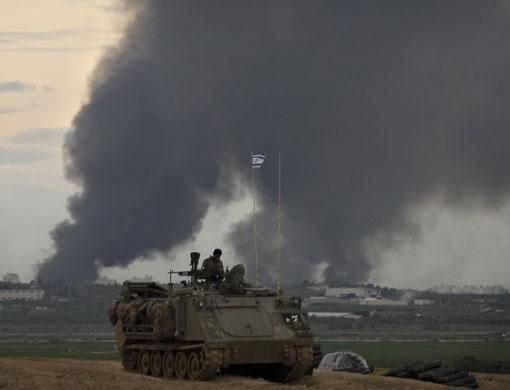Gaza: Israeli warplanes are pounding the homes of Hamas leaders in the Gaza Strip, with ground troops edging closer to the territory's densely populated urban centre.
Monday's fighting is stepping up pressure on the militant group ahead of a key decision on whether to escalate a devastating two-week offensive.
The army began sending reserve units into Gaza to assist thousands of ground forces already in the territory, it said on Sunday. The use of reserves is a strong signal that Israel is planning to move the offensive into a new, more punishing phase.
Israeli ground forces headed deeper into densely populated Gaza neighbourhoods, with tanks rolling into residential areas and infantry fighting urban warfare in streets and buildings.
An Israeli army spokeswoman said residential neighbourhoods in Gaza are filled with homemade bombs and booby traps, including mannequins placed at apartment entrances to simulate militants and rigged to explode if soldiers approach.
The army "is advancing more into urban areas," said the spokeswoman, Maj. Avital Leibovich. "Since the majority of the Hamas militants are pretty much in hiding in those places, mainly urban places, then we operate in those areas."
Early on Monday, Israeli navy gunboats fired more than 25 shells at Gaza City, setting fires and shaking office buildings, including the local bureau of The Associated Press.
The military said that in general, the targets are Hamas installations but had no immediate information about the shelling that began just after midnight.
At least 900 Palestinians have died as Israel's campaign against Hamas entered its 17th day on Monday.
Outgoing Prime Minister Ehud Olmert said Israel had made progress in its objectives in the Gaza offensive but was not finished yet.
"Israel is nearing the goals that it set for itself," Olmert said. "However, further patience, determination and effort are necessary in order to achieve those goals in a way that will change the security reality in the south."
Hamas has said it will not consider a ceasefire until Israel stops all attacks, and pulls out of Gaza.
In an e-mail message early on Monday, Hamas leader Ismail Radwan also demanded opening of all border crossings, emphasising the Rafah crossing with Egypt.
Palestinian medical officials reported about 60 deaths on Sunday, including 17 who died of wounds suffered on previous days. Most of those killed were noncombatants, medical officials said, including four members of one family killed when a tank shell hit their home near Gaza City, and a 10-year-old girl killed in a similar attack.
Palestinian witnesses said Israeli troops moved to within half a mile of Gaza City's southern neighborhoods, and within a quarter mile of the northern neighborhood of Shaikh Ajleen.
Israel ground forces intensify Gaza operation
Israel ground forces head deeper into Gaza neighbourhoods













